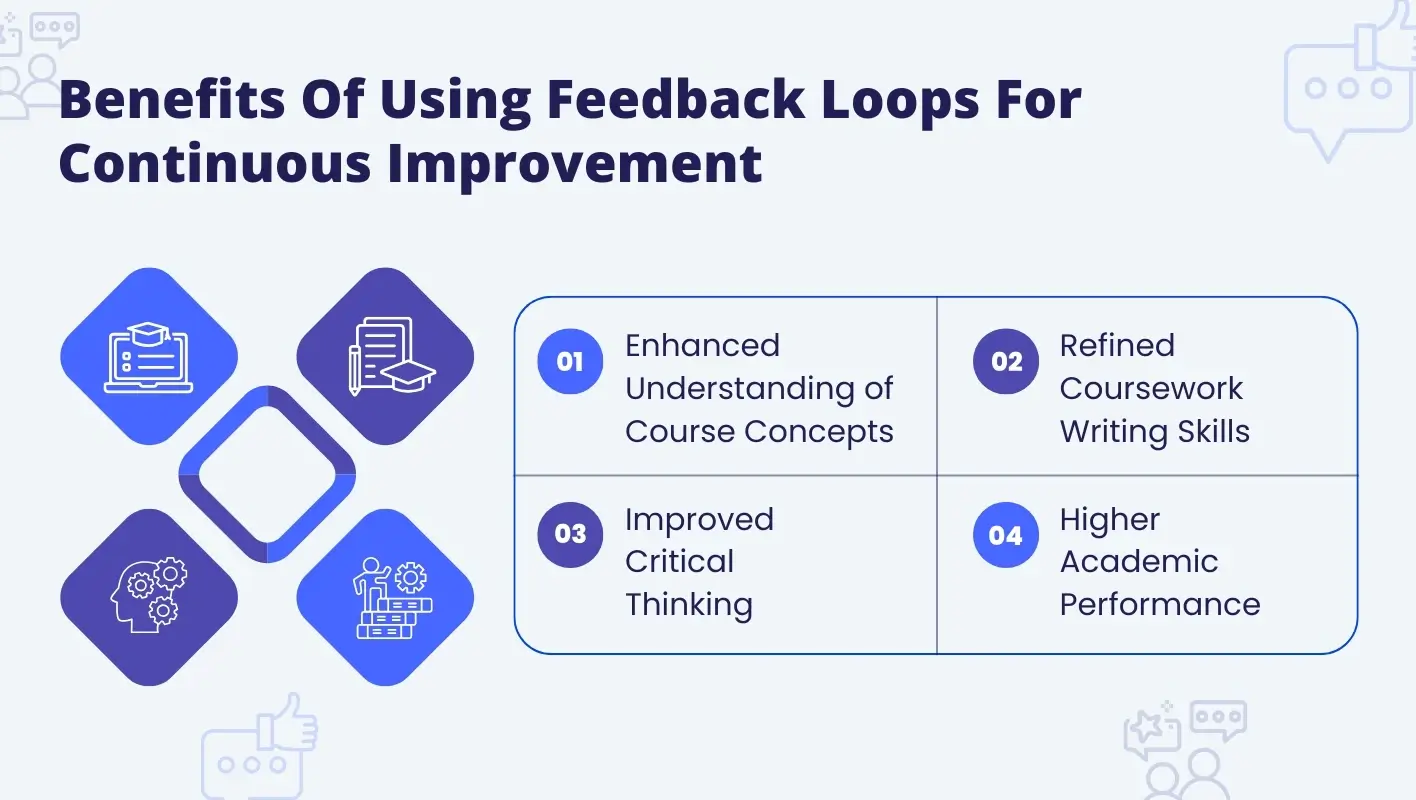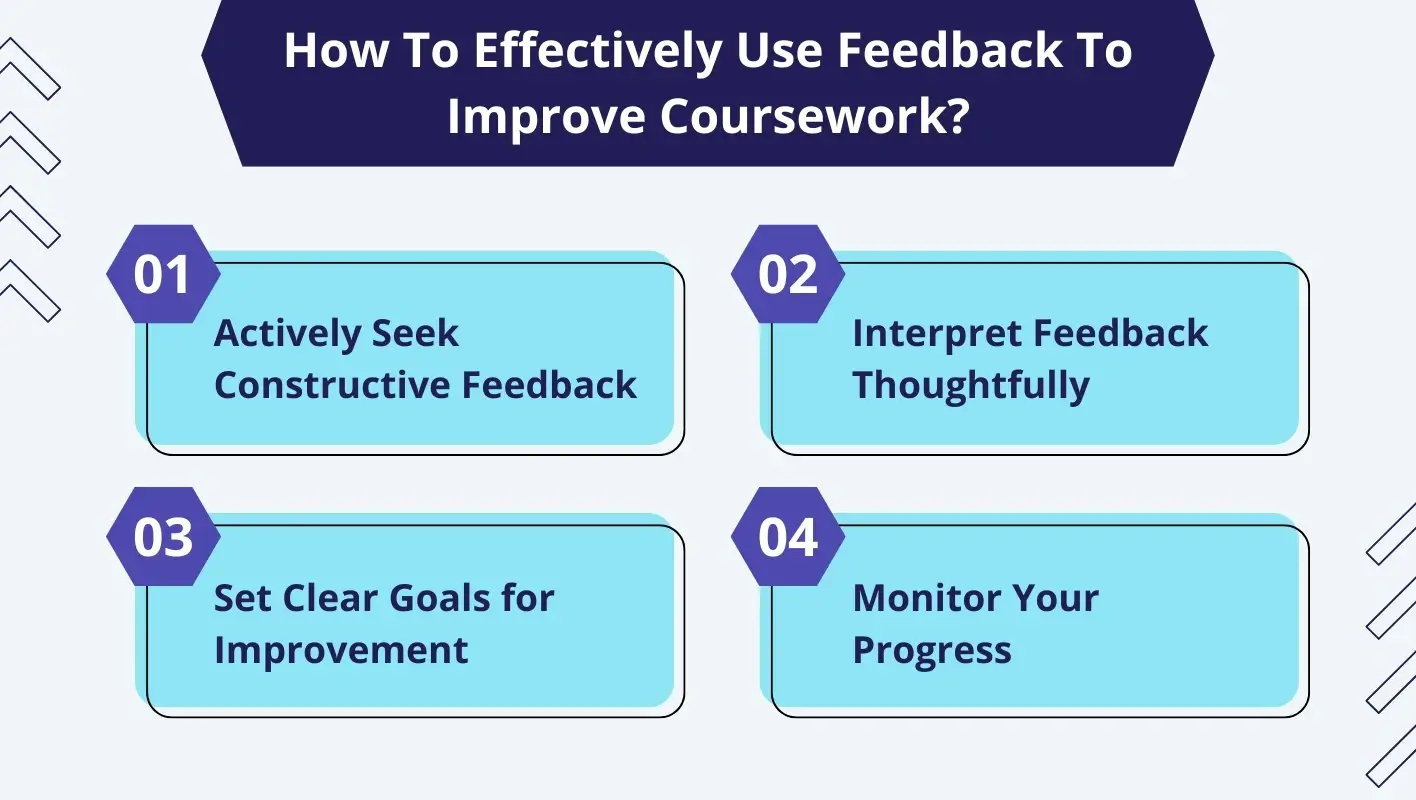
Feedback is vital in any learning process to help enhance students' skill sets and knowledge. Feedback loops offer a more systematic way of improving the quality of coursework as the process progresses. These loops help students enhance their work, hence quality, comprehension, and achievement.
Feedback enhances the learning process and works best to improve coursework writing. Learners need to understand the impact of feedback on the coursework. Let's explore them in depth!
The concept of feedback loop means that students are given feedback, use it, make amendments, and then submit the work. This cycle continues to go on in a cycle to foster an improvement process. The feedback can be from the teachers, fellow students, or oneself. In each cycle, the student's knowledge of the subject and ability to put it into writing improve and become more refined.
Paying attention to the feedback on coursework is crucial as it helps improve the learning process. Feedback is not just a mark on the assignment but a way of enhancing the learning process.
It offers precise recommendations on how students can develop a writing style, argument construction, or research approach. The students who use feedback to enhance their coursework will likely improve their skills. It also helps them to prevent common errors and achieve expected outcomes.
Here are some reasons why using feedback loops can improve coursework:

Feedback loops make the students return to their assignments, which aids in learning the concepts better. This way, the students get a general idea of the course's content by implementing the feedback, enabling them to know areas they may have left out in their submissions that they would not only see if they had received the feedback.
It is important to note that feedback loops have been known to play a crucial role in enhancing the quality of coursework writing. It is a common practice to identify problems that need to be solved, whether it is better organisation of ideas, better thesis statements, or arguments. Feedback and revision allow students to refine their arguments and improve their communication.
Comments on the coursework may contain prompts that require students to reflect on their work more critically. Whether students challenge their assumptions, improve their arguments, or reevaluate the evidence, this process helps to enhance critical thinking skills. The feedback loop encourages students to think critically by reflecting on their thoughts and actions.
If students learn to incorporate feedback into their assignments, it will positively influence their evaluation and performance. Rather than making the same mistakes or misinterpreting what the professor wants, students who use feedback to improve their coursework will likely do better in the following assignments and tests. They gradually build on previous efforts, which leads to better results in the final score.
Your First Order
Get 20% OFF!
Use feedback constructively and improve the coursework; students must have the right attitude and plan. Here are some essential steps:

It is essential to be able to comprehend feedback. It is not always clear what feedback is being given, or it may even be conflicting. If that happens, ask for the information. It is essential to know why the input is being provided, and do not hesitate to ask for an explanation. When feedback is given and received, it is best to understand and use it properly.
When you get feedback, make sure that you are in a position to understand how you can implement the feedback. For instance, if your professor observes that your arguments must be better developed, you should ensure that your ideas are well organised. Goals enable you to channel your energy in the right direction and also monitor your achievements as you work towards their attainment.
After identifying your goals, you can now make some changes based on the feedback you received. It could include rearranging parts of your paper, revising your thesis statement, or providing more supporting data for your claims. Every revision should demonstrate the consideration of feedback and the progress made toward enhancing the quality of your coursework.
When you have made revisions based on feedback, monitor how you are doing over time. Review past assignments and determine which topics or concepts require further focus. It will enable you to improve the quality of coursework and ensure that you avoid repeating common errors.
Feedback loops are not limited to a particular assignment or course. They help students prepare for the future, learn how to solve problems, accept feedback, and always do their best. This process is critical not only in the academic environment but also in the workplace.
In most professions, it is essential to accept critiques and improve performance in the future. Frequent feedback to enhance the quality of coursework helps students foster crucial skills like critical analysis, problem-solving, and flexibility. These are skills that they can use in their academic process and their respective jobs.
Using feedback to improve one's performance is an excellent method for achieving academic success. Students can enhance their skills, knowledge of the course content, and performance. Feedback is not only about telling the students where they went wrong. It also encourages them to think, develop, and motivate.
In this way, reflection and revision can help students improve essential skills that will benefit them in the future. If you need more information or require assistance enhancing your coursework, you can always seek help from Quick Assignment Hub. Our professional team will help you meet your academic goals and overcome challenges with your assignments.
© Copyright Quick Assignment Hub All rights reserved.